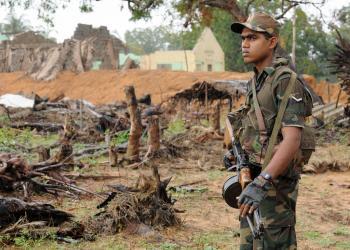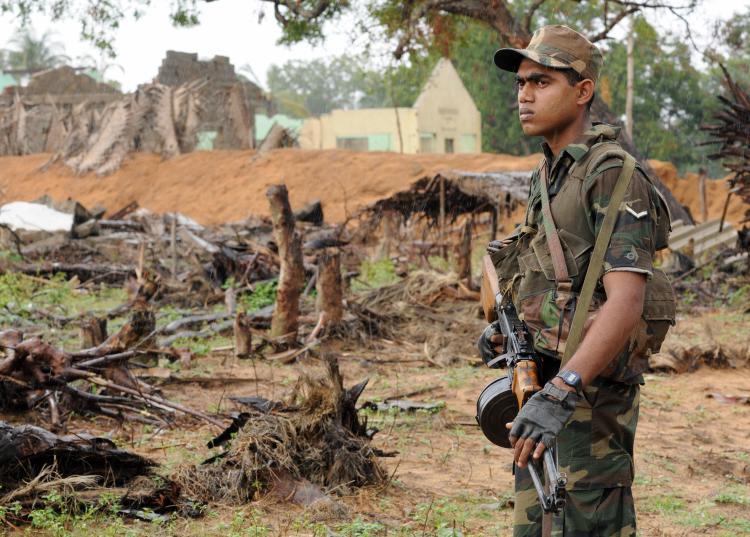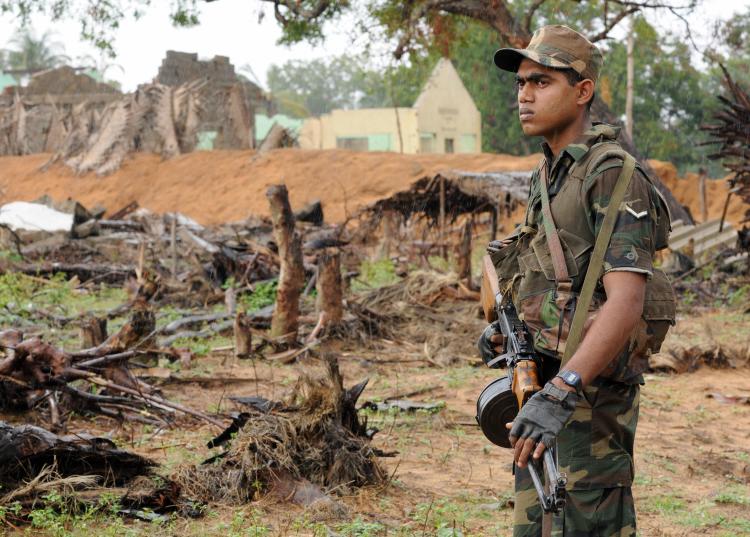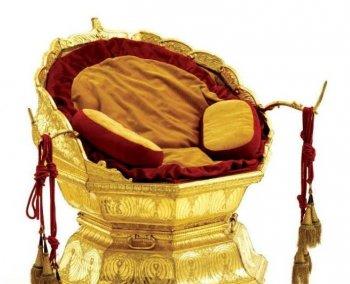MULLAITIVU, Sri Lanka—Sri Lankan Army soldiers have captured Mullaitivu, the last major town held by the Tamil Tigers in North-East Sri Lanka. Army Chief Lt. Gen. Sarath Fonseka told Sri Lankan media that his forces “completely captured” the town on Jan. 25, after a month of fighting.
The Liberation Tigers of Tamil Eelam (LTTE) terrorist organization is now cornered in a small region to the North-East of the country—but they are not expected to give up. The Sri Lankan army advancing into the jungle faces constant resistance, yet hopes remain high: “The end of terrorism is near, and we will definitely win,” declared Fonseka to AFP.
“We have surrounded them from all sides and the only option for them is to jump into the sea,” he said.
The whereabouts of the LTTE chief, Velupillai Prabhakaran, is still unknown. Some speculate that he might have fled the country somewhere on a fleet of Czech-made “Zlin 143” single-engine aircrafts, which recently went missing.
Sri Lankan President Mahinda Rajapakse also made remarks, paying tribute to the soldiers, who he referred to as “war heroes who have fought relentlessly to eradicate terrorism from our motherland.”
LTTE sources have given no comments regarding the whereabouts of Prabhakaran, or the defeat they face fighting in the north-east. The terrorist group is not expected to give up fighting and it is widely expected that they will continue guerrilla warfare while hiding in the jungles. Fighters carry a cyanide capsule with which to commit suicide if they are caught by enemy forces.
“The military phase has come to an end, but the conflict will go on,” said Jayadeva Uyangoda, the head of political science department at the University of Colombo, to AFP. “The Tigers may not be able to regain the political or military power that they had before, so they will return to guerrilla tactics.”
The fate of about 150,000-250,000 Tamil people who live in the area remain uncertain. Both the Sri Lankan Government and U.N. agencies accuse the LTTE of holding the population as human shields. On Jan. 24, a day before the city of Mullaitivu was captured by troops, the LTTE blasted a large irrigation tank, flooding a town and marooning thousands of civilians. “Not only LTTE had created a humanitarian catastrophe but have also shown their utmost contempt of the very people once they said to ’represent,'” commented a military official, according to the Sri Lankan news portal Go2Lanka.
The LTTE was formed in 1975, and now fights for a separate state for Tamil people in Sri Lanka. At least 70,000 people are estimated to have been killed and a large number disabled, caught in the crossfire over the years, including by stepping on landmines left by the group. LTTE is banned as a terrorist organization by the European Union, the U.S., and Canada. Neighboring India, which trained and armed the LTTE in the 1980s, also recently banned the organization.
According to Hicham Mandoudi, head of operations for the International Committee of the Red Cross, in areas under Tiger control in Sri Lanka the civilian population is tired and longing for peace and security. His remarks are featured in an interview on the humanitarian organization’s website. “From the civilians’ point of view, there is hope that this will end one day, and that their children will live in peace and be able to go to school and return home, without fear,” he said.
The Liberation Tigers of Tamil Eelam (LTTE) terrorist organization is now cornered in a small region to the North-East of the country—but they are not expected to give up. The Sri Lankan army advancing into the jungle faces constant resistance, yet hopes remain high: “The end of terrorism is near, and we will definitely win,” declared Fonseka to AFP.
“We have surrounded them from all sides and the only option for them is to jump into the sea,” he said.
The whereabouts of the LTTE chief, Velupillai Prabhakaran, is still unknown. Some speculate that he might have fled the country somewhere on a fleet of Czech-made “Zlin 143” single-engine aircrafts, which recently went missing.
Sri Lankan President Mahinda Rajapakse also made remarks, paying tribute to the soldiers, who he referred to as “war heroes who have fought relentlessly to eradicate terrorism from our motherland.”
LTTE sources have given no comments regarding the whereabouts of Prabhakaran, or the defeat they face fighting in the north-east. The terrorist group is not expected to give up fighting and it is widely expected that they will continue guerrilla warfare while hiding in the jungles. Fighters carry a cyanide capsule with which to commit suicide if they are caught by enemy forces.
“The military phase has come to an end, but the conflict will go on,” said Jayadeva Uyangoda, the head of political science department at the University of Colombo, to AFP. “The Tigers may not be able to regain the political or military power that they had before, so they will return to guerrilla tactics.”
The fate of about 150,000-250,000 Tamil people who live in the area remain uncertain. Both the Sri Lankan Government and U.N. agencies accuse the LTTE of holding the population as human shields. On Jan. 24, a day before the city of Mullaitivu was captured by troops, the LTTE blasted a large irrigation tank, flooding a town and marooning thousands of civilians. “Not only LTTE had created a humanitarian catastrophe but have also shown their utmost contempt of the very people once they said to ’represent,'” commented a military official, according to the Sri Lankan news portal Go2Lanka.
The LTTE was formed in 1975, and now fights for a separate state for Tamil people in Sri Lanka. At least 70,000 people are estimated to have been killed and a large number disabled, caught in the crossfire over the years, including by stepping on landmines left by the group. LTTE is banned as a terrorist organization by the European Union, the U.S., and Canada. Neighboring India, which trained and armed the LTTE in the 1980s, also recently banned the organization.
According to Hicham Mandoudi, head of operations for the International Committee of the Red Cross, in areas under Tiger control in Sri Lanka the civilian population is tired and longing for peace and security. His remarks are featured in an interview on the humanitarian organization’s website. “From the civilians’ point of view, there is hope that this will end one day, and that their children will live in peace and be able to go to school and return home, without fear,” he said.






